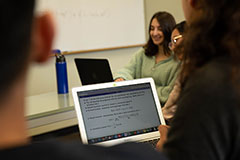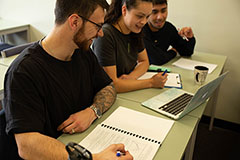Making data count
Statisticians can be thought of as explorers finding information in data. They collect, analyse and interpret data to help researchers and decision-makers. The collaborative nature of statistics is one of its most rewarding features.
Statisticians also design and carry out research. They rely on computational skills, quantitative abilities, analytical reasoning and communication skills. At Otago, the Statistics Group works in ecology, bioinformatics, biostatistics, quantitative genetics and on problems such as disease spread and seismic and volcanic hazards.
Career opportunities in statistics
Anywhere data are collected, analysed or interpreted, you find people with statistical training.
Because the world is becoming more and more data-focused, the demand for graduates has outstripped supply. Statisticians use computational skills, statistical knowledge, quantitative abilities and communication skills to help make decisions in the face of uncertainty.
Examples include evaluating the environmental effects of air, water, and soil pollutants, and designing and analysing studies to determine whether new drugs and medical procedures are safe and effective, and using marketing and customer data to improve business decisions.
Graduates in Statistics are employed in companies such as Fonterra and Spark, government departments such as Statistics NZ and the Department of Conservation, and in research institutes and consulting firms.
By working in statistics, you can combine your interest with almost any other field in science, technology or business. You can also go on to postgraduate study at Otago or your choice of top-ranking universities internationally.
A minor in Statistics alongside any other major is a big drawcard for employers: data is everywhere and knowing how to analyse and interpret it will help you succeed no matter where your career takes you.
Data science – how is it different from statistics?
Statistics and data science are closely related disciplines – both are about learning from data. Statisticians and data scientists collaborate with people in a broad range of fields across the sciences, commerce and art.
- Statistics is a scientific discipline that considers the best ways to learn from data in the presence of variation and uncertainty.
- Data science is a field at the intersection between computer science, information science and statistics. At Otago, an undergraduate degree in Data Science is taught collaboratively by the Departments of Statistics, Information Science and Computer Science.
Find out more about studying Data Science
Quantitative Genetics
Otago also offers a postgraduate qualification in Quantitative Genetics through the Master of Applied Science programme. This programme uses statistical methods to understand the complexities of genetic inheritance.
Find out more about studying Quantitative Genetics


